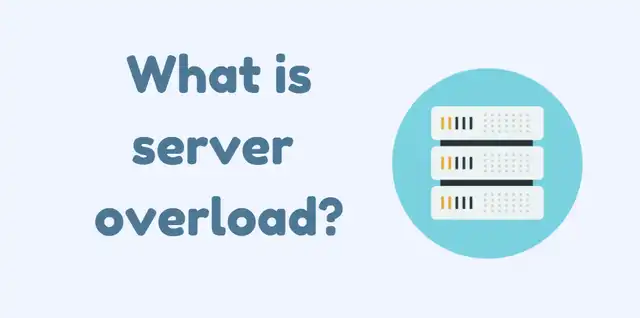What is server overload? A server overload occurs when a server is unable to handle the amount of traffic it is receiving. This can be caused by a number of things, but the most common cause is when too many people are trying to access the same website or application at the same time.
When this happens, the server can become overloaded and may not be able to respond to all of the requests it is receiving. This can cause the website or application to become slow or unresponsive, and in some cases, may even cause it to crash.
What causes server overload?

There are many possible causes of server overload, but the most common is simply having too many users trying to access the server at the same time. This can happen if a website or application becomes very popular suddenly, or if there is a sudden spike in traffic due to a news event or other circumstances.
Other causes can include denial of service attacks, where malicious users try to overload the server with requests in order to make it unavailable to legitimate users, and hardware or software failures.
How to prevent server overload?
There are many ways to prevent server overload. One way is to add more servers. This will increase the capacity of your system and help prevent overload. Another way is to load balance your system. This will distribute the workload evenly across all of your servers and help prevent any one server from becoming overloaded.
How to troubleshoot server overload?
There are a few things you can do to troubleshoot server overload:
- Check your server’s CPU usage. If the CPU is maxed out, that could be the cause of the problem.
- Check your server’s memory usage. If the server is running low on memory, that could also be causing the problem.
- Check your server’s disk usage. If the disk is getting full, that could be the cause of the problem.
- Restart your server. This will clear out any temporary files that may be causing the problem.
- If all else fails, contact your hosting provider and ask them to take a look at your server.
What are the consequences of server overload?
There are a number of consequences that can occur when a server becomes overloaded. One of the most common is that the server may become unresponsive or slow down significantly. This can impact user experience and cause frustration.
Additionally, an overloaded server may crash, which can lead to data loss or corruption. In extreme cases, an overloaded server can even Cause physical damage to the hardware.
How to fix server overload?
Different web hosting providers use different techniques to stop server overload. You can try the following methods to fix this problem:
- Ask your web hosting provider to increase the resources allocated to your account. This will help if the problem is caused by insufficient resources.
- Enable caching on your website. This will reduce the load on your server by storing frequently accessed data in memory.
How to avoid server overload in the future?
As you may know, we experienced a server overload yesterday that caused some downtime for our website. We are very sorry for the inconvenience and want to avoid this in the future.
There are a few things we can do to prevent this from happening again:
- First, we need to increase our server capacity so that we can handle more traffic without overloading the system.
- Second, we can improve our website so that it is more efficient and doesn’t use as much resources.
- Finally, we can try to spread out the traffic more evenly so that our servers are not overloaded at peak times.
We are working hard to implement these changes as soon as possible and we Thank you for your patience and understanding.
Conclusion
In conclusion, the causes of server overload are numerous and varied. In most cases, it is due to a sudden influx of traffic or a spike in demand for resources. However, it can also be caused by a number of other factors, such as faulty hardware, software bugs, or human error.
Server overload can have a serious impact on businesses, causing downtime and loss of revenue. It is therefore important to be aware of the potential causes and to have systems in place to prevent or mitigate the effects of an overloaded server.




Add Comment